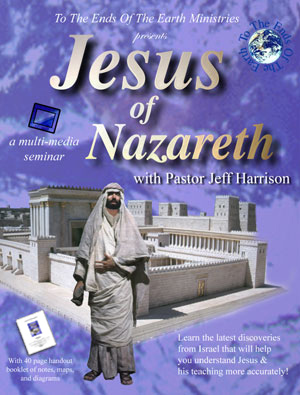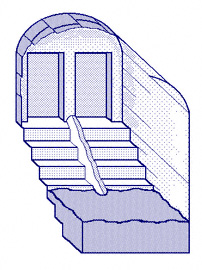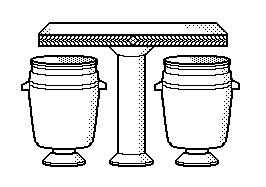Jesus of Nazareth
—A Landmarks of Faith Seminar—

Lecture #3b Audio
Jesus’ Early Life and Trade
 See notes below.
See notes below.Lecture #3e Video: Cana and Weddings (Hosted by YouTube)
Lecture #3b:
Or click here for more listening options at Internet Archive.
__________________________
Lecture #3b Notes
More notes for Video 3c:
BETHLEHEM (Continued)

And this will be the sign to you: you will find a baby wrapped in cloths and lying in a feeding trough [manger]
Stone: was considered to be ritually clean by the rabbis. Unclean pottery had to be broken and discarded. Unclean metal vessels had to be heated and scrubbed. But stone vessels remained clean.
2 Sam. 22:3: My God, my rock, in whom I will trust.
(Also Psalm 18:2,31,46; 42:9; 62:7; 78:35; 89:26; 94:22.)
Luke 2:8: And in the same region there were shepherds living outdoors and taking turns keeping watch over their flock during the night [guarding by watches of the night]
JEWISH CALENDAR (opens in a new window)
John 10:7: I am the door of the sheep.
John 1:14: And the word became flesh, and began to tabernacle among us...
Magi: Priests of the Parthian Empire. Their religion was a mixture of Zoroastrianism and other pagan beliefs.
Parthian Empire: The Eastern rival of the Roman Empire. The two were constantly at war with each another. It was located in the same general area as the earlier Persian Empire of the book of Esther.
Zoroastrianism: The religion of Persia (Iran) before its conversion to Islam. Founded by Zarathushtra (6th cent. BC), who taught a universal struggle of good and evil (ethical dualism).
Rab-mag: Chief of the magi. Daniel was made the Rab-mag in the Babylonian kingdom of Nebuchadnezzar after interpreting Nebuchadnezzar’s dream (Dan. 2:48).
Dan. 7:13: I was seeing in visions of the night, and look, with the clouds of the heavens, one like a son of man was coming...
Matt. 2:1-2: Now after Jesus was born...magi from the East arrived in Jerusalem, saying,
Where is the one who was born King of the Jews?
Matt. 2:3: When King Herod heard it, he was troubled, and all Jerusalem with him.
Matt. 2:8: When you have gone, make a careful search for the child; but when you have found him, report to me, so that I, too, may come and worship him.
To protect his throne, Herod had several of his sons and his wife Mariamne killed. He also gathered Jewish leaders to Jericho and planned to have them killed when he died. (Fortunately, the order was not carried out.)
Matt. 2:16: Then when Herod saw that he had been tricked by the magi, he became very enraged, and sent and slew all the male children who were in Bethlehem and in all its environs, from two years old and under, according to the time which he had learned from the magi.
Alexandria: Probably where Mary and Joseph took the baby Jesus in Egypt. Alexandria had a large Jewish community.
Matt. 2:22: But when he [Joseph] heard that Archelaus was reigning over Judea in place of his father Herod, he was afraid to go there. And being warned in a dream, he departed for the regions of Galilee.
Notes for Video 3d:
Am Ha’aretz: The people of the land.
Ordinary Jewish people who were not as strict as the Pharisees thought they should be in observing the Law.
John 7:49: This crowd which does not know the Law is accursed.
John 1:46: Can any good thing come out of Nazareth?
Nazarenes: The name given by the Jews to the Christian movement (Acts 24:5). (In Hebrew: Notzrim.)
Isaiah 11:1: A shoot [a rod] will come out from the stump of Jesse, and a branch [netzer] from its roots will bear fruit.
Matt. 2:23: Jesus and his family came and lived in a city called Nazareth [Natzeret], that what was spoken through the prophets might be fulfilled [in Isa. 11:1], that he will be called a Nazarene.
TRADE
Matt. 13:55: Isn’t this the son of the builder [tekton]? Isn’t his mother called Mariam?
Tekton: Builder, construction worker. In Israel, worked mostly with stone.
Sepphoris: Regional capital of Galilee during Jesus’ boyhood. Only four miles from Nazareth. The nearest market town for Mary and Joseph.
BAPTISM
Isa. 40:3: The voice of one crying in the desert,
Make ready the way of the Lord
Matt. 3:12: His winnowing fork is in his hand, and he will thoroughly clear his threshing floor, and he will gather his wheat into the barn, but he will burn up the chaff with unquenchable fire.
Threshing Floor: A flat area of rock where grain was crushed with a thresing sled.
Winnowing: The separation of the wheat from the chaff by throwing it up into the breeze.
Luke 3:16: I am not fit to untie the thong of his sandals
Mikveh: A Jewish ritual bath used for cleansing from ritual impurity, many varieties of which are mentioned in Lev. 15.

Mark 7:4 When they come from the market place, they do not eat unless they immerse themselves; and there are many other things which they have received in order to observe, such as the immersing of cups and pitchers and copper pots
Conversion to Judaism: required circumcision (for males), a sacrifice at the Temple in Jerusalem, and a ritual bath (mikveh).
Matt. 3:9-10: Bring forth fruit in keeping with repentance; and don’t suppose you can say to yourselves,
We have Abraham for our father
; for I say to you, that God is able from these stones to raise up children to Abraham.
(The Essenes taught about ritual immersion (baptism): No one is to go into water in order to attain the purity of holy men. For men cannot be purified except they repent of their evil
(Manual of Discipline 5.7-)
(Josephus, the Jewish historian, said of John’s baptism: He was a good man, and commanded the Jews to exercise virtue...and so to come to baptism; so that the washing with water would be acceptable...not for putting away certain sins, but for the purification of the body; supposing still that the soul was thoroughly purified beforehand by righteousness
(Antiquities 18.5.2 § 117)
Matt. 3:16: ...the Spirit of God descending like a dove
(Also Mark 1:10, Luke 3:22, John 1:32).
Isa. 11:2: And the Spirit of the Lord will rest on him
Genesis 1:2: ...the Spirit of God was hovering over the surface of the waters
The Rabbis taught about the Spirit:
(Gen. Rab. 2:4).And the Spirit of God hovered [like a bird]
(Gen. 1:2). This alludes to the spirit of King Messiah, as you read, And the Spirit of the Lord will rest on him
(Isa. 11:2)
Matt. 3:17: And look, a voice out of the heavens, saying,
This is my beloved Son, with whom I am pleased.
Bat qol: The daughter
(or echo) of the voice of God. It was heard three times during the ministry of Jesus (Matt. 3:17, 17:5; John 12:28).
(Our Rabbis taught: Since the death of the last prophets—Haggai, Zechariah, and Malachi—the Holy Spirit departed from Israel; yet they were still able to avail themselves of the bat-qol. Once when the Rabbis were met in the upper chamber of Gurya’s house at Jericho, a bat-qol was heard from heaven, saying:
(Sanh. 11a:7).There is one among you who is worthy that the Shekinah should rest on him as it did on Moses, but his generation does not merit it
Notes for Video 3e:
John 2:11: This beginning of his signs [that took place in his ministry], Jesus did in Cana of Galilee, and manifested his glory, and his disciples believed in him.
Choni the Circle-drawer: A famous miracle worker in Israel just before the time of Jesus.
John 2:1: And on the third day there was a wedding in Cana of Galilee
(on Tuesday)
Jewish Days of the Week: Sunday is the First Day of the week, Monday the Second Day, etc., to Friday which is the day of Preparation
for the Sabbath, followed by the Sabbath.

John 2:6: Now there were six stone water pots standing there, in compliance with the purity laws of the Jews, containing twenty or thirty gallons each.
1 Tim. 5:23: Don’t only drink water anymore, but rather use a little wine because of your stomach and your frequent sicknesses.
Rom. 14:21: It is good not to eat meat or to drink wine or to do anything by which your brother stumbles.
Betrothal (Kiddushin): At the house of the bride’s parents, the bridegroom gives his pledge to the bride. The couple is considered married, though they are not yet living together.
Wedding Feast (Nissuin): The bridegroom comes with his friends to the bride’s house to get her and take her to his father’s house. There the wedding feast is held and the marriage consummated.
2 Cor. 5:5: Now he who prepared us for this very purpose is God, who gave to us the Spirit as a pledge.
John 14:2: In my Father’s house are many room; but if not why would I have said to you that I go to prepare a place for you?
1 Thess 4:17: Then we, the living who remain, at the same time together with them will be snatched up in the clouds in order to meet the Lord in the air. And in this way we will always be together with the Lord.
Isa. 25:6-9: And the Lord of armies will hold for all the peoples on this mountain [Mt. Zion; see Isa. 24:23] a banquet of rich food, a banquet of well-aged wine; of rich food full of marrow, of refined well-aged wine. And he will swallow up, on this mountain...the veil that is woven over all the nations. He will swallow up death forever, and the Lord God will wipe the tear from every face, and will remove the reproach of his people from all the earth; for the Lord has spoken. And it will be said in that day,
Look! This is our God, we have waited for him and he will save us. This is the Lord, we have waited for him. Let us rejoice and be glad in his salvation [yeshuah].